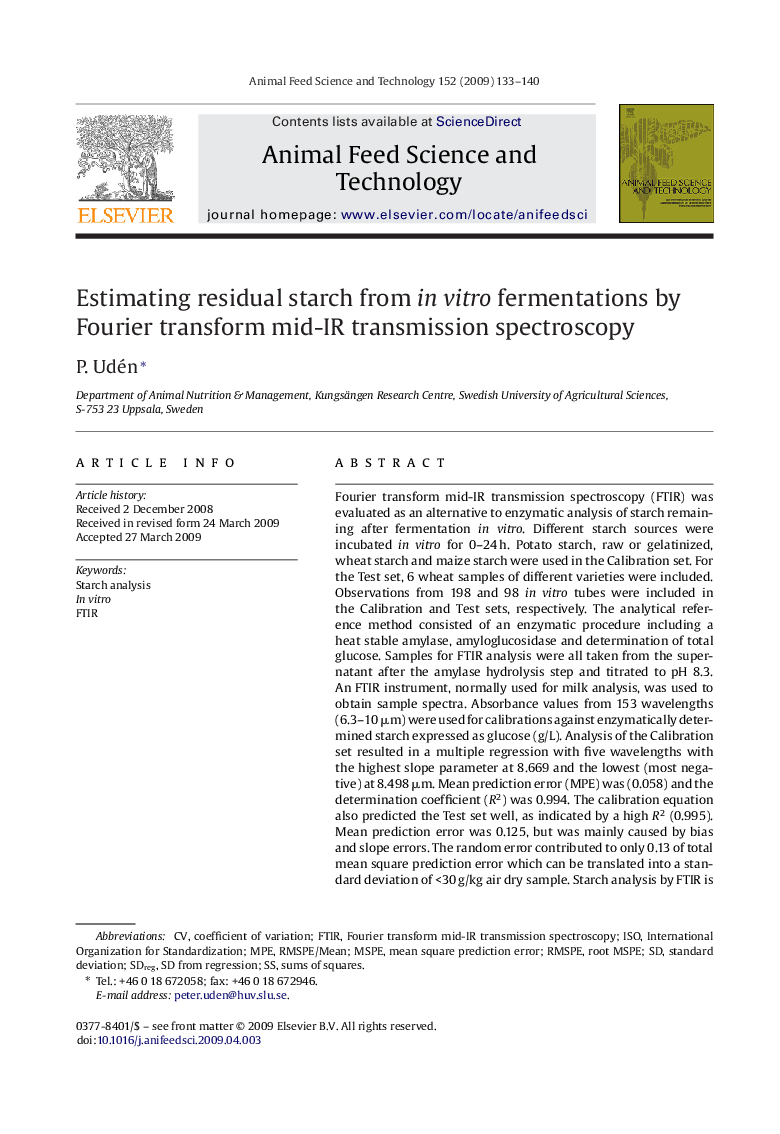| کد مقاله | کد نشریه | سال انتشار | مقاله انگلیسی | نسخه تمام متن |
|---|---|---|---|---|
| 2420384 | 1552456 | 2009 | 8 صفحه PDF | دانلود رایگان |
عنوان انگلیسی مقاله ISI
Estimating residual starch from in vitro fermentations by Fourier transform mid-IR transmission spectroscopy
دانلود مقاله + سفارش ترجمه
دانلود مقاله ISI انگلیسی
رایگان برای ایرانیان
کلمات کلیدی
MPERMSPEMSPEstandard deviation - انحراف معیارISO - ایزوStarch analysis - تجزیه و تحلیل نشاستهIn vitro - درونکشتگاهیInternational Organization for Standardization - سازمان بین المللی استاندارد سازیCoefficient of Variation - ضریب تغییرFTIR - طیف سنج مادون قرمزSums of squares - مجموع مربعاتmean square prediction error - میانگین خطای پیش بینی مربع
موضوعات مرتبط
علوم زیستی و بیوفناوری
علوم کشاورزی و بیولوژیک
علوم دامی و جانورشناسی
پیش نمایش صفحه اول مقاله

چکیده انگلیسی
Fourier transform mid-IR transmission spectroscopy (FTIR) was evaluated as an alternative to enzymatic analysis of starch remaining after fermentation in vitro. Different starch sources were incubated in vitro for 0-24 h. Potato starch, raw or gelatinized, wheat starch and maize starch were used in the Calibration set. For the Test set, 6 wheat samples of different varieties were included. Observations from 198 and 98 in vitro tubes were included in the Calibration and Test sets, respectively. The analytical reference method consisted of an enzymatic procedure including a heat stable amylase, amyloglucosidase and determination of total glucose. Samples for FTIR analysis were all taken from the supernatant after the amylase hydrolysis step and titrated to pH 8.3. An FTIR instrument, normally used for milk analysis, was used to obtain sample spectra. Absorbance values from 153 wavelengths (6.3-10 μm) were used for calibrations against enzymatically determined starch expressed as glucose (g/L). Analysis of the Calibration set resulted in a multiple regression with five wavelengths with the highest slope parameter at 8.669 and the lowest (most negative) at 8.498 μm. Mean prediction error (MPE) was (0.058) and the determination coefficient (R2) was 0.994. The calibration equation also predicted the Test set well, as indicated by a high R2 (0.995). Mean prediction error was 0.125, but was mainly caused by bias and slope errors. The random error contributed to only 0.13 of total mean square prediction error which can be translated into a standard deviation of <30 g/kg air dry sample. Starch analysis by FTIR is precise and will simplify the analytical procedure and reduce the cost of analysis considerably.
ناشر
Database: Elsevier - ScienceDirect (ساینس دایرکت)
Journal: Animal Feed Science and Technology - Volume 152, Issues 1â2, 10 June 2009, Pages 133-140
Journal: Animal Feed Science and Technology - Volume 152, Issues 1â2, 10 June 2009, Pages 133-140
نویسندگان
P. Udén,